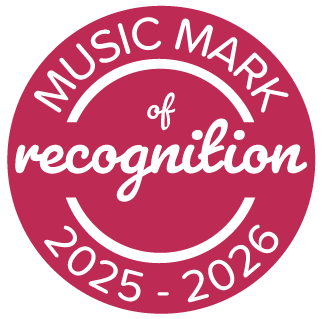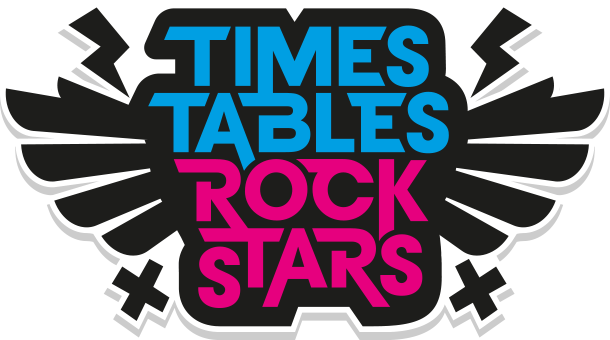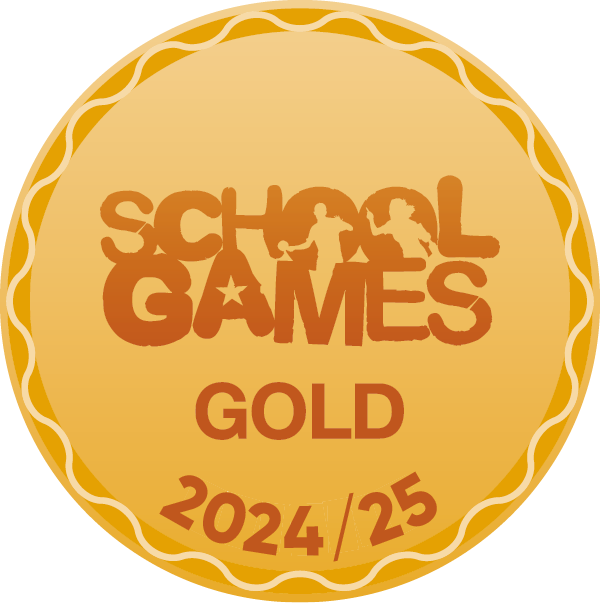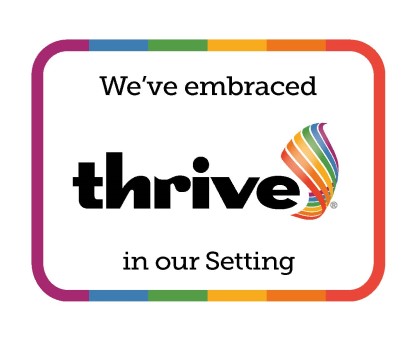Our Curriculum
Religious Studies
St. Patrick’s provides an environment in which children can grow in their knowledge and understanding of the Catholic Faith and develop their own relationship with Christ. We want our children to understand that religion is not just for learning but for living.
Our Mission Statement:
“Under God’s umbrella we will achieve together”
is embedded into the daily life of the school.
Curriculum
Learning & Growing as the People of God
The schools of the Archdiocese of Birmingham use the Diocese’s own curriculum strategy from Foundation (Nursery) to Year 6 called ‘Learning & Growing as the People of God.’ (often referred to as the Strategy). The Strategy was written using the Learning Outcomes provided in the Bishops’ Conference document the Curriculum Directory as a basis. Rather than produce a lesson by lesson scheme of work the Strategy provides teachers with a range of suggested cross-curricula activities which they can use and adapt to suit the needs of the learners in their class in order that their children achieve the learning outcomes. This flexibility also allows teachers to incorporate their own ideas, creativity and imagination into the delivery of the Strategy.
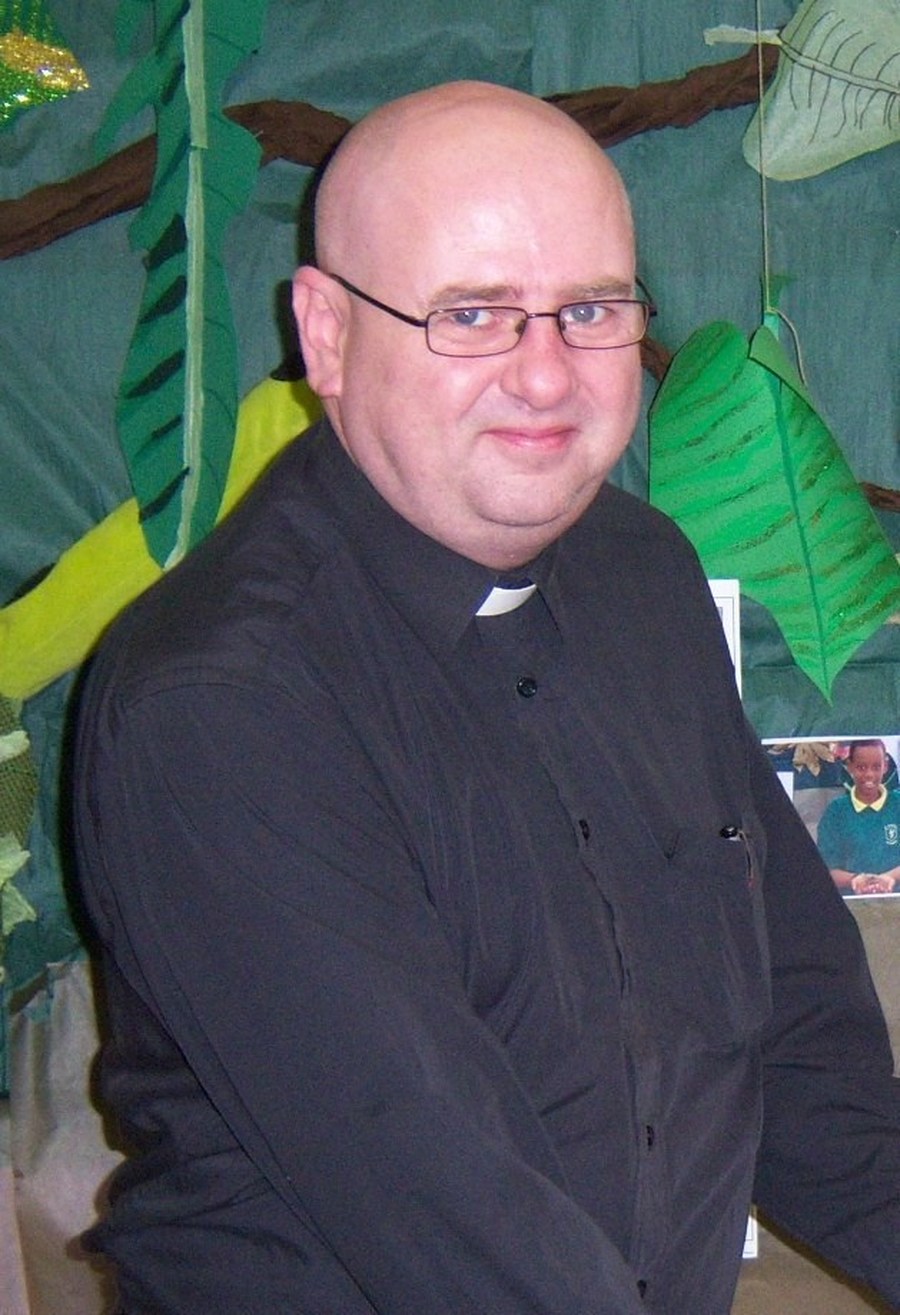
Father George Bennett – Parish Priest
The Strategy is divided into a number of units, usually 12, which cover four main areas of study. It is through the construction of a spiral curriculum that children’s knowledge and understanding is developed. The children learn about the Liturgical Seasons of the Church’s year. They find out about the significance of each season, its particular signs and symbols and the different liturgies celebrated in each season. The children also study both Old Testament and New Testament Scripture in order to give them familiarity and knowledge of Scripture as well as allowing them to explore and understand how our Catholic beliefs are rooted in what Scripture reveals to us. There is a strong Sacramental focus in each year group. In particular the content of the Y3 and Y6 books fully prepares the children to receive the Sacraments of Reconciliation and Eucharist in Y3 and Confirmation in Y6. As part of the strategy the children learn about what it is to live as Christians today, how the Church is organised from global to parish level and also the opportunities which exist for them to participate in the life of the Church.
A key element to each unit is the opportunity to link the learning with opportunities for prayer and reflection.
Within the topics there are opportunities for exploring and appreciating aspects of other faiths. We encourage links with other faiths and cultures whenever we can to broaden children’s understanding.
Sacramental Preparation
In Year 3 children are prepared for First Holy Communion and Reconciliation through Parish based programmes that are supported by the school curriculum.
In Year 6 pupils continue their journey of faith by preparing for the Sacrament of Confirmation.
Prayer Life
At St. Patrick’s we help our pupils to develop a reverential attitude in their prayer life and to make prayer a natural part of their daily lives. Children are exposed to a variety of prayer experiences, both formal and informal, private and communal. Children are given opportunities to compose their own prayers and take an active part in school Masses and non-Eucharistic liturgies. Daily collective worship takes place either as a whole school, key stage or class. It provides an opportunity for children and teachers to worship and reflect on the Liturgy and consider spiritual, moral, social and cultural issues. Parents have the right to withdraw their child from collective worship and religious education, which we respect. As a Catholic school, however, both are an integral part of our mission and we would hope that parents would not exercise this option.
Fr George, our parish priest, visits our school. All KS2 classes celebrate Mass on a 2 week rota basis and have the opportunity to lead a whole school mass throughout the course of the year. Years 4, 5 and 6 go to confession in the Church on a termly basis.
We enjoy weekly assemblies on Monday and Friday. On Monday we reflect on the Sunday’s Gospel and share a mission for the week. On Friday we come together with parents to celebrate our successes in learning and pray together as one family.
School Masses and Assemblies take place during the year and parents are welcomed and encouraged to join their children on these occasions
English
The National Curriculum sets out what pupils should be taught and attainment targets set out the expected standards of pupils’ performance. It is for schools to choose how they organise their school curriculum to include the programmes of study.
Please follow this link: please click here
Milestones for writing
Milestones for reading
Helping your child at home with writing.
St Patrick’s Reading Scheme
Here at St. Patrick’s we place a great focus on Reading. We are very lucky to have such a super library and resources and believe that one of the most important gifts our school can give a child is the power to read. As you may be aware each year group change reading books and listen to children read differently, this could be listening to your child read individually or as a group in guided reading. This is due to the age and reading ability of your child. Our approach and commitment to reading is the same across the school but the frequency in which books are changed does differ from year group to year group.
Range of Oxford reading books include, Floppy Phonics, Traditional Tales, Project X and Treetops.All these books are colour coded to ensure progression through the reading scheme.
Foundation Stage –Children are allocated one book per week, as well as their Read Write Inc phonics sounds to learn. Each reading book, either a wordless book or one with text, encourage discussion and book talk, as well as activities to enjoy with your child to foster a love of books and early reading skills. Parents are asked to comment in their child’s reading diary about a discussion you may have had about the book, how they read the text or any activities they have attempted that have originated from the book.
Key Stage One – Children use the colour banded books so they can progress through the reading scheme. Children change their books on a regular basis when they have finished reading that book. When sharing a book at home or at school, children need to discuss the title, illustrations and read the text. Book talk is extremely important so that children demonstrate understanding of the text and have the opportunity to ask and answer questions. Parents are asked to comment in their child’s reading diary when they share a book together at home. At times your child may receive a book they have had previously – this may be for consolidation of skills, understanding themes or text types or for enjoyment. Year 2 are encouraged to choose their own books from their reading level band and at some point through the year will bring a library book home for additional reading. All year groups are asked to bring their reading books to school with their reading diary every day.
Key Stage 2 Each year group will be listened to at least once a week in guided reading– this involves children reading and discussing a text in small groups with a teacher or teaching assistant for a minimum of half an hour. In addition, children read individually at least once a week, as a daily activity in free flow to teachers, TAs or volunteer reading partners. It is important that we still hear our KS2 children read and take opportunities to discuss their texts in order to develop their higher level reading and comprehension skills. The teachers will make comments in the child’s reading diary and therefore ask parents to do the same. For the majority of children in KS2 they will be on a colour band, this is matched to their ability. Within each colour band is a wide range of texts and genres as well as a range of texts of varying difficulty. On the whole the children are given the freedom to choose books that they think they will enjoy – therefore some books may seem harder or easier than others. Teachers will keep an eye on the texts chosen to ensure that your child is being challenged. We also encourage children to bring in books, magazines, comics etc from home. Magazines and comics can often encourage reluctant readers and give children confidence to read for pleasure. Each year group is scheduled to visit the library once a week; however the library will be open every lunchtime for children to change their books or for quiet reading time. Child friendly newspapers are also available in the classrooms and library.
Children choosing a book to read from our reading scheme.
Below are some useful documents to help your children
Romero Progression document ..This will help you see the progression in writing throughout the school.
Useful websites to help your child in phonics and sentence work
Click here for phonics
Click here for sentence doctor
Click here for KS 2 phonics
Ruth Miskin’s ‘Read Write Inc.’ At St. Patrick’s Primary School
At St. Patrick’s we have taken the very important decision to adopt the” Read, Write Inc.” Phonics programme written by Ruth Miskin. We are dedicated to ensuring that each and every one of our children learn to read with accuracy and confidence. We believe that the Read, Write Inc. programme will allow us to do this, as well as allowing us to support you in fostering a love of reading in your child that will last a lifetime!
At the core of the programme is the lively and vigorous teaching of synthetic phonics. Children learn the 44 common sounds in the English language and how to sound-blend words for reading (decoding) at the same time as developing handwriting skills and spelling (encoding). As their confidence in decoding develops they are taught to comprehend and compose ideas for their own writing. The children have the pleasure of reading exciting storybooks perfectly matched to their level – so that they have early success in reading!
The children follow a structured programme of reading and writing activities in groups of up to 12. The majority of staff have been trained in the delivery of this programme. It is a programme designed for children to complete as soon as possible. It begins in the Foundation Stage and once your child is reading at a level 2a they will have completed the programme.
Read, Write Inc. has 5 underlying principles – the five Ps
- PACE – no time is wasted during teaching sessions! Children are active and involved in a fun and creative way. The aim is for the children to complete the programme as quickly as possible.
- PRAISE – teachers praise the children constantly throughout the teaching sessions. Children learn more quickly when they are praised for what they do well, rather than nagged for what they do wrong. The children are encouraged to praise each other and as a school we have developed several ‘Praise Phrases’ and ‘Praise actions’! Ask your child to demonstrate!
- PURPOSE – each activity has a very clear purpose. The teacher will set this purpose at the beginning of the lesson so that the children know exactly what they will be learning.
- PARTICIPATION – all children take part in all parts of the lesson. Full participation is gained through partner work and choral response.
- PASSION – as a staff we are passionate about our teaching and the benefits of the Read, Write Inc. programme! We love teaching the sessions and this enthusiasm rubs off onto the children.
Click on lionk below to find more information and activities for Read Write Inc
http://www.oup.com/oxed/primary/rwi/
Maths
Mathematics is a creative and highly inter-connected discipline that has been developed over centuries, providing the solution to some of history’s most intriguing problems. It is essential to everyday life, critical to science, technology and engineering, and necessary in most forms of employment. A high-quality mathematics education therefore provides a foundation for understanding the world, the ability to reason mathematically, and a sense of enjoyment and curiosity about the subject.
Maths interventions
We are very pleased with the progress our children are making in maths thanks to the additional support they are receiving from our maths intervention groups.
These groups are in addition to maths lessons and ensure children are reaching their targets.
The interventions are: 1st class Maths @, 1st class @ number 1 and 2
success @ arithmetic
The children love the sessions that include playing maths based games with our brilliant teaching assistants!
Click the links below to see our routeways through calculation.
Addition
Subtraction
Multiplication
Division
Use these bookmarks to help your child achieve in mathematics
Please click here for Level 1
Please click here for Level 2
Please click here for Level 3
Please click here for Level 4
Please click here for Level 5
For a useful interactive maths site click here
Science
A high-quality science education provides the foundations for understanding the world through the specific disciplines of biology, chemistry and physics. Science has changed our lives and is vital to the world’s future prosperity, and all pupils will be taught essential aspects of the knowledge, methods, processes and uses of science. Through building up a body of key foundational knowledge and concepts, pupils will be encouraged to recognise the power of rational explanation and develop a sense of excitement and curiosity about natural phenomena. They will be encouraged to understand how science can be used to explain what is occurring, predict how things will behave, and analyse causes.
Aims
The national curriculum for science aims to ensure that all pupils:
- develop scientific knowledge and conceptual understanding through the specific disciplines of biology, chemistry and physics
- develop understanding of the nature, processes and methods of science through different types of science enquiries that help them to answer scientific questions about the world around them
- are equipped with the scientific knowledge required to understand the uses and implications of science, today and for the future
Working scientifically
During years 1 and 2, pupils will be taught to use the following practical scientific methods, processes and skills through the teaching of the programme of study content:
- asking simple questions and recognising that they can be answered in different ways
- observing closely, using simple equipment
- performing simple tests
- identifying and classifying
- using their observations and ideas to suggest answers to questions
- gathering and recording data to help in answering question
During years 3 and 4, pupils will be taught to use the following practical scientific methods, processes and skills through the teaching of the programme of study content:
- asking relevant questions and using different types of scientific enquiries to answer them
- setting up simple practical enquiries, comparative and fair tests
- making systematic and careful observations and, where appropriate, taking accurate measurements using standard units, using a range of equipment, including thermometers and data loggers
- gathering, recording, classifying and presenting data in a variety of ways to help in answering questions
- recording findings using simple scientific language, drawings, labelled diagrams, keys, bar charts, and tables
- reporting on findings from enquiries, including oral and written explanations, displays or presentations of results and conclusions
- using results to draw simple conclusions, make predictions for new values, suggest improvements and raise further questions
- identifying differences, similarities or changes related to simple scientific ideas and processes
- using straightforward scientific evidence to answer questions or to support their findings.
During years 5 and 6, pupils will be taught to use the following practical scientific methods, processes and skills through the teaching of the programme of study content:
- planning different types of scientific enquiries to answer questions, including recognising and controlling variables where necessary
- taking measurements, using a range of scientific equipment, with increasing accuracy and precision, taking repeat readings when appropriate
- recording data and results of increasing complexity using scientific diagrams and labels, classification keys, tables, scatter graphs, bar and line graphs
- using test results to make predictions to set up further comparative and fair tests
- reporting and presenting findings from enquiries, including conclusions, causal relationships and explanations of and a degree of trust in results, in oral and written forms such as displays and other presentations
- identifying scientific evidence that has been used to support or refute ideas or arguments
| Name |
|
| science-key-objectives.pdf |
Download |
Showing 1-1 of 1
Experiments you can try at home.
http://scifun.chem.wisc.edu/homeexpts/homeexpts.html
https://sciencebob.com/category/experiments/
http://www.sciencekids.co.nz/experiments.html
http://www.iflscience.com/chemistry/unfinished-20-fun-science-experiments-you-can-do-home/
Creative Curriculum
At St. Patrick’s Catholic Primary School, we follow a ‘themed-based’ approach to the curriculum. This means that wherever possible, we group our subjects around a theme. The subjects covered are Science (KS1 only), Computing, Art & Design, Design & Technology, Geography, History, Music and Languages. We call this our Creative Curriculum. The topics we choose depend on two factors: what areas of the National Curriculum we must cover and the interests and needs of the children.
Please click the links for the National Curriculum Programmes of study:
Science – click here
Computing – click here
Art and Design – click here
Design & Technology – click here
Geography – click here
History – click here
Music – click here
Languages (KS2) – click here
Music
This year we are aiming for our Artsmark Award. Music is a large part of this.
At St Patrick’s music is a subject which provides children with vital opportunities to develop their aural memory, make
musical judgments, apply their new learning, express themselves creatively, using a wide range of materials and instruments.
“Music is a universal language that embodies one of the highest forms of creativity. A high quality music education should engage and inspire pupils to develop a love of music and their talent as musicians, and so increase their self-confidence, creativity and sense of achievement. As pupils progress, they should develop a critical engagement with music, allowing them to compose, and to listen with discrimination to the best in the musical canon.” National Curriculum Music. Click here to see the National Curriculum for Music.
In KS1, music is delivered through the Creative Curriculum and use of Music Express.
In KS2, music specialists have been brought in to deliver the music curriculum. The children have greatly enjoyed learning to play new musical skills in theory and practical lessons.
There is also an extra curricula guitar club for our KS2 children, with Mrs Claire Rogers. These often result in fantastic concerts performed to the whole school!
Year 1 and Year 5 also participate in Morning of Music, supported by the PAS. This year’s topic is Space! They will be attending and sharing their music with other schools in March.
Click here to see the milestones that children are expected to reach in Music at the end of Year 1/2 (milestone 1), Year 3/4 (milestone 2) and Year 5/6 (milestone 3).
Art and Design
At St Patrick’s, Art and Design has a significant and valuable role to play in the ethos of the school. We believe that these subjects can be a fantastic means of developing visual thinking and creativity. They can help to develop a sense of purpose, achievement and success and also increase self esteem.
Children in all of the different key stages are encouraged to explore the visual language of art and design. They investigate a wide variety of materials, tools, methods and techniques through their activities using the creative curriculum. They are encouraged to talk about their work and that of others.They are given opportunities to explore the history of art and the work of artists and designers.
Children’s artwork plays an important part in creating an exciting learning environment within classrooms and opportunities in which to present work in other curriculum areas. Children’s work from all classes is displayed throughout the school. Outstanding pieces of art work are ‘exhibited’ on our ‘Art Star ‘ board for all of the children, parents and staff to enjoy.
Click on the photos below to see our current ‘Art Stars’.
These are our amazing Art Stars for Summer!
Here are our fantastic Art Stars for Autumn 2015
Modern Foreign Languages
The teaching of Language at St Patrick’s is vibrant and exciting. In Early Years and Key Stage 1 the focus is on many different languages, particularly those spoken by the children. Opportunities are taken to compare words from different languages, and during Registration an observer would be likely to notice the children responding with greetings in a variety of languages.
The language being discretely taught at Key Stage 2 is French. The teaching is delivered by a language specialist from Cardinal Wiseman. The MFL curriculum for Key Stage 2 follows the guidelines set out in the National Curriculum languages programme of study. (https://www.gov.uk/government/publications/national-curriculum-in-england-languages-progammes-of-study/national-curriculum-in-england-languages-progammes-of-study). Our aim is for Key Stage 2 children to leave with the skills and knowledge they need to continue their learning in MFL in Key Stage 3.
Computing
he new computing curriculum aims to educate pupils to use computational thinking and creativity to understand and change the world. The core of computing is computer science, in which pupils are taught the principles of information and computation, how digital systems work, and how to put this knowledge to use through programming. Building on this knowledge and understanding, pupils are equipped to use information technology to create programs, systems and a range of content. Computing also ensures that pupils become digitally literate – able to use, and express themselves and develop their ideas through, information and communication technology.
At St Patrick’s, Computing is integrated into our enriching curriculum. Computing is used within lessons to support the learning and enable the children to make better progress. Both Key Stage 1 and 2 children frequently use the iPads in their lessons as there are numerous apps used within school that allow the children to create animations, video games, eBooks and much more. Key Stage 2 children also enjoy using Google Chromebooks in their lessons as this tool allows for collaborative learning
For more information on the computing curriculum click here .
To see what Computing Club have been up to click here.
DB Primary
DB Primary is a safe, intuitive and easy to navigate primary learning platform designed to engage and educate the next generation of learners. All children have their own blog, calendar email and e-portfolio allowing pupils to take control of their virtual learning. Pupils can contribute to forums, send emails, share favourite pieces of work, take surveys and comment on resources. Online group communities allow teachers to easily set tasks which pupils can complete whilst boosting their ICT skills. If you have any questions regarding DB Primary, please see Miss Bartell (Y5).
The children also use Purple Mash for their computing work. Follow link to visit the website.
Skoolbo
Skoolbo is a great new site to help with reading and maths. The children really enjoyed taking part in the Skoolbo challenge.
Physical Education
his year we have signed up the Games Mark Award. We are currently working towards the bronze level of achievement. To achieve this we are aiming to increase our children’s participation and enjoyment of the Physical Education.
Our children take part in many competitions, across KS1 and KS2. So far this year our children have competed in:
* Y3/4 football Tournament
* Y5/6 Athletics Heats
* Y5/6 Athletics Final
We also have a Y5/6 football and netball team, both involved in the Catholic League.
It is very important that our children demonstrate our Catholic values and ethos in these competitions, as well as trying their best.
Congratulations Year 5 and 6
Well done to those children who took part in the Athletics final. They came 3rd overall, out of 25 schools across the city.
Each week at least one child from each year group from Y1- Y6 is chosen to be the PE star of the week. They are presented with a certificate in the Friday Celebration assembly. Children are chosen not only for their physical ability but for their motivation and sportsmanship.
Assessment and Targets
Assessment and targets are essential when it comes to your child knowing what level they are currently performing to. With the help of assessment and targets, your child will be able to see what they would need to do to improve. Each term there will be a new sport introduced and for each sport there will be standards to which your child can assess their own level. Click on the attached items below.
key_stage_1_and_2_levels_and_targets_for_football(1).docx
key_stage_1_and_2_levels_and_targets_for_gymnastics.docx
key_stage_1_and_2_levels_and_targets_for_hockey.docx
key_stage_1_and_2_levels_and_targets_for_invasion_games.docx
key_stage_1_and_2_levels_and_targets_for_netball(1).docx
All pupils have one and a half hours of PE timetabled each week. Alongside the PE Curriculum the children have the opportunity to participate in numerous lunchtime and after school sports clubs.
Netball: Defending Skills Netball Defending Skills
Netball:Shooting Techniques Shooting Techniques
Netball: Catching SkillsCatching Skills
Reading Recovery
Reading Recovery is an accredited school-based literacy programme for the lowest achieving children aged five and six that enables them to reach age-expected levels within 20 weeks.
This will recommence in May 2017.
Congratulations to Mrs. Bale who successfully completed her Reading Recovery Teacher Training.


If you wish to find out more about the curriculum that we follow. Click this link for more information.

 024 76612671
024 76612671





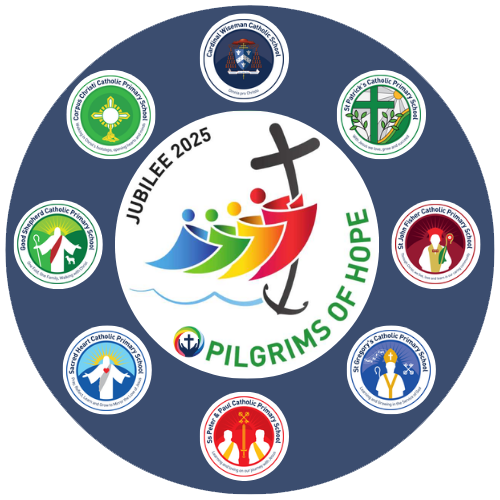







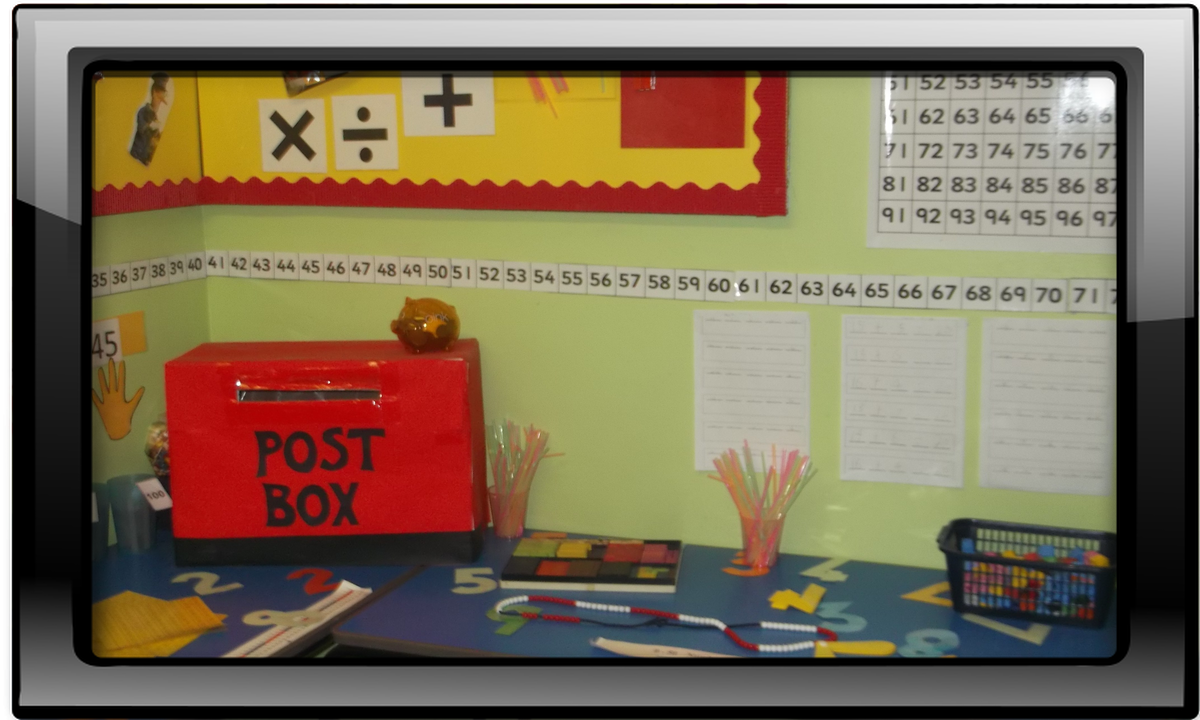
![DSCF6742[1].JPG DSCF6742[1].JPG](https://img.cdn.schooljotter2.com/sampled/3322878/740/600/nocrop//)
![DSCF6743[1].JPG DSCF6743[1].JPG](https://img.cdn.schooljotter2.com/sampled/3322884/740/600/nocrop//)











